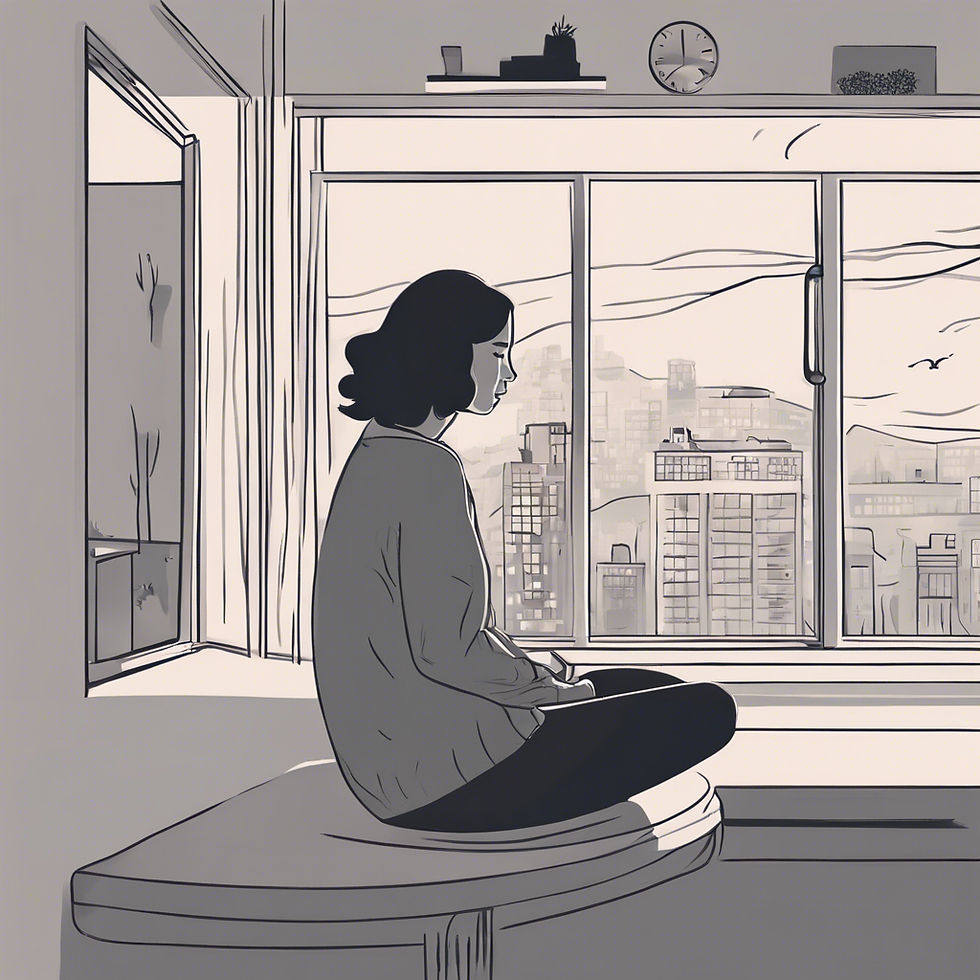Navigating the Challenges of Being a Stay-at-Home Mom: Practical Solutions for Mental Wellness
- Abella Studios
- Nov 22, 2024
- 8 min read
Updated: Dec 3, 2024
Introduction

Being a stay-at-home mom is a role filled with love, dedication, and countless moments of joy. Yet, it also comes with unique challenges that can often feel overwhelming. While many may perceive staying at home as a privilege, the reality is that it demands immense physical, mental, and emotional strength. Unfortunately, many stay-at-home moms struggle with feelings of isolation, stress, emotional exhaustion, and anxiety. Understanding these common issues and knowing how to address them effectively is crucial for maintaining mental wellness and achieving a sense of balance and fulfillment.
1. The Challenge of Isolation and Loneliness

Challenge: One of the most significant mental health challenges faced by stay-at-home moms is isolation. Day after day spent at home or running errands without adult interaction can result in deep feelings of loneliness. This lack of connection can exacerbate stress and contribute to mental health struggles such as depression and anxiety.
Solution: Building a strong support network is essential for combating feelings of isolation. This could include joining local mom groups, attending community events, or participating in children’s activities where there’s an opportunity to meet other parents. For moms who may not have immediate access to in-person support, online communities and social media groups dedicated to moms can offer a valuable source of connection and advice. These connections can be lifelines, providing shared experiences, emotional support, and reassurance that you are not alone.
2. Managing Stress and Preventing Burnout

Challenge: The responsibilities of a stay-at-home mom can feel endless. From meal preparation and household chores to managing the children’s schedules and needs, it can seem like there’s no end to the to-do list.
The constant demands can easily lead to stress and, over time, burnout. Burnout isn’t just physical exhaustion—it’s a state of emotional and mental depletion that affects overall mental health and well-being.

Solution: Prioritizing self-care is not selfish; it is essential for mental wellness. Carving out even 15-30 minutes a day for activities that rejuvenate you can be a game changer. This might involve meditation, deep breathing exercises, reading, or enjoying a hot bath. Additionally, moms should consider sharing responsibilities with their partner or other family members. Delegating tasks helps reduce stress and promotes a sense of shared ownership of the household workload, which can be transformative for overall mental health.
3. The Struggle to Find Personal Time
Challenge: Stay-at-home moms often feel as though their identities become solely defined by their caregiving role, leaving little room for personal growth, hobbies, or self-reflection. The result is a gradual loss of self, where personal aspirations take a backseat to the needs of the family. This can lead to feelings of unfulfillment and resentment, further impacting emotional health.

Solution: Integrating personal time into your daily routine is essential for maintaining mental wellness. Scheduling even small, dedicated moments throughout the day can help. Whether it’s setting time aside for journaling, listening to a podcast, or working on a creative project, these activities help preserve your sense of identity and fulfillment. Partnering with friends or family members to watch the kids for an hour or two can provide the necessary space to focus on personal time. This not only benefits your mental health but also models the importance of self-care for your children.
4. Emotional Exhaustion and Feeling Underappreciated

Challenge: The work of a stay-at-home mom is often invisible, and the emotional labor involved in managing the household is not always recognized. This can lead to feelings of emotional exhaustion and underappreciation, which can compound stress and contribute to anxiety or depressive symptoms. Being constantly “on” and taking care of everyone else’s needs without acknowledgment can leave moms feeling depleted.

Solution: One of the best ways to address emotional exhaustion is by practicing self-recognition. A simple yet effective practice is keeping a daily journal to jot down accomplishments, big or small. This tangible reminder of what you’ve achieved each day can help reinforce your value and boost your mental health. Additionally, having open conversations with your partner or other family members about the emotional labor you perform can foster greater understanding and support. Sharing your feelings helps others appreciate your efforts and can encourage them to express gratitude, easing the burden of emotional exhaustion.
Challenge: Many stay-at-home moms experience anxiety and depression at various points. The continuous responsibilities, combined with a lack of personal time and limited social connection, create an environment ripe for mental health issues. Postpartum depression is a specific form of depression that many new moms face, but ongoing anxiety and depression can affect moms long after the postpartum period has ended.

Solution: Maintaining mental health is just as important as taking care of your physical health. Incorporating practices like mindfulness meditation, gentle exercise (such as yoga or walking), and deep breathing exercises can help manage anxiety. Regular physical activity boosts endorphins, which naturally improve mood. However, if symptoms persist, seeking professional therapy is highly recommended. Therapy provides a safe space to express your feelings, identify stressors, and develop effective coping strategies. Mental health professionals can guide you in building resilience and learning techniques that support long-term emotional wellness.
6. The Pressure of Family Expectations and Societal Norms
Challenge: Many stay-at-home moms feel pressure to meet both societal and family expectations. Whether it’s maintaining a spotless home, ensuring children are engaged in educational activities, or preparing nutritious meals, these high expectations contribute to stress and anxiety. The fear of being judged as a less-than-perfect mom can result in pushing oneself too hard, which harms mental health.

Solution: Setting realistic expectations is vital for maintaining mental wellness. Understand that perfection is an illusion, and chasing it only leads to frustration and self-doubt. Embrace the idea of “good enough” and set boundaries on what you can reasonably accomplish each day. Learning to say “no” when tasks become overwhelming and being open to redefining success on your terms can make a significant difference. Flexibility and self-compassion are key components of mental wellness. By acknowledging your limits, you’re better equipped to manage stress and preserve your emotional health.
7. The Importance of Social Connections
Challenge: Strong social connections are essential for mental wellness. A lack of interaction with peers can lead to feelings of loneliness and isolation, which negatively impact overall mental health. Stay-at-home moms often spend most of their time surrounded by young children, which, although rewarding, doesn’t replace the need for adult interaction.

Solution: Making time for social connections is a non-negotiable aspect of supporting your mental health. Scheduling regular meet-ups with friends, participating in playdates, or attending local events can foster a sense of community and belonging. Virtual socializing through video calls or participating in online forums can also bridge the gap when in-person interaction isn’t possible. These efforts can combat isolation, reduce stress, and promote mental wellness by providing a safe space to share experiences and advice.
How Mental Health and Therapy Help Solve These Issues...
Sometimes, the strategies that moms use to manage stress and emotional health aren’t enough. In these cases, seeking professional support can be a powerful step. Therapy provides the tools and support necessary to process emotions, develop healthy coping strategies, and navigate the complexities of being a stay-at-home mom. It’s important to recognize that seeking help is not a sign of weakness but rather a proactive approach to mental wellness.

Therapy plays a vital role in addressing the challenges that stay-at-home moms face. Engaging in therapy helps moms understand the root causes of their stress, anxiety, or depression and equips them with evidence-based strategies for managing their mental health. Through counseling, moms can learn to balance their roles, set healthy boundaries, and cultivate self-compassion.
Mental health professionals provide a nonjudgmental space where moms can express their feelings, receive validation, and work through their struggles. With the right support, stay-at-home moms can transform their approach to self-care, build resilience, and find sustainable ways to nurture both themselves and their families.
Conclusion
Being a stay-at-home mom is an incredible journey that requires patience, dedication, and strength. While the challenges are real—ranging from isolation and stress to anxiety and emotional exhaustion—there are many ways to manage and overcome them. Incorporating self-care routines, building social connections, setting realistic expectations, and seeking therapy can make a profound difference in mental wellness.

Remember, taking care of your mental health is not just important for you; it benefits your entire family. By investing in yourself, you’re setting a powerful example for your children and creating a more balanced, fulfilling life.
Mental health is a continuous journey, and seeking support when needed is a sign of strength. Embracing professional help and prioritizing your well-being will enable you to thrive, not just survive, in your role as a stay-at-home mom.
Being a Stay-at-Home Mom FAQs:
(Practical Mental Wellness Solutions For The Stay-at-Home Mom)

1. Why do stay-at-home moms often feel isolated?
Stay-at-home moms can experience isolation due to spending extended periods at home or engaging in routines that lack adult interaction. This limited social engagement can lead to feelings of loneliness and exacerbate stress, potentially contributing to mental health challenges such as depression and anxiety.
2. How can I combat feelings of isolation as a stay-at-home mom?
Building a strong support network is crucial. Consider joining local mom groups, attending community events, participating in children's activities where you can meet other parents, or connecting with online communities and social media groups for moms. These connections provide shared experiences, emotional support, and reassurance.
3. What leads to stress and burnout in stay-at-home moms?
The constant demands of childcare and household management can lead to chronic stress. This can develop into burnout, a state of emotional and mental depletion that affects overall well-being. It's not just physical tiredness; it's a feeling of being overwhelmed and emotionally drained.
4. How can I manage stress and prevent burnout as a stay-at-home mom?
Prioritizing self-care is vital. Schedule even short periods for activities that help you recharge, such as meditation, reading, or a relaxing bath. Delegating tasks to your partner or family members can also reduce stress and create a more balanced workload.
5. Why is it important to find personal time as a stay-at-home mom?
Dedicating time for personal pursuits helps maintain a sense of identity and fulfillment beyond the caregiving role. Engaging in hobbies, pursuing interests, or simply having time for self-reflection prevents feelings of being lost in the demands of motherhood.
6. How can I create personal time when my schedule is so full?
Integrate small pockets of personal time into your day. This could be as simple as reading for a few minutes, listening to a podcast while doing chores, or dedicating a short period to a creative hobby. Even these small moments can make a difference.
7. What can I do about feeling emotionally exhausted and underappreciated?
Practice self-recognition by acknowledging your accomplishments. Keep a journal to document your daily achievements, no matter how small. Openly communicate with your partner or family about the emotional labor involved in running a household to foster understanding and support.
8. How can therapy benefit stay-at-home moms struggling with their mental health?
Therapy provides a safe and supportive environment to address the unique challenges of being a stay-at-home mom. It helps identify stressors, develop coping strategies, and learn techniques for managing anxiety and depression. A therapist can also help you work on setting healthy boundaries and cultivating self-compassion.






















Comments